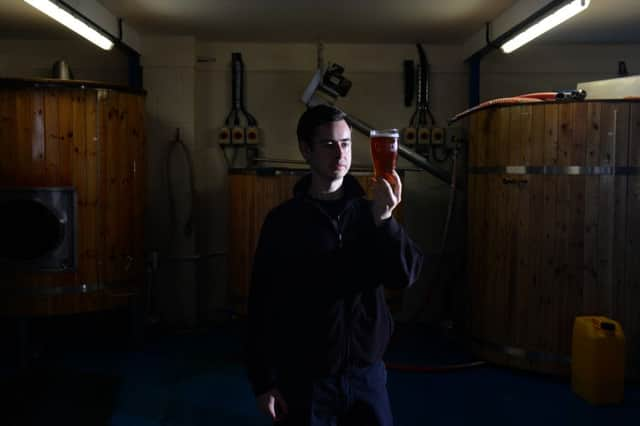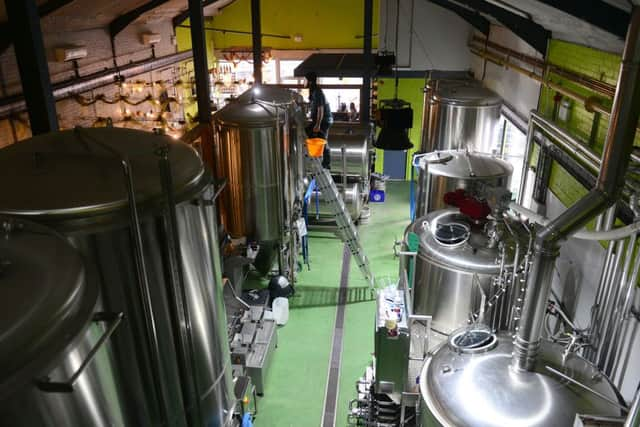Hop and glory on Sheffield's ale trail


Whatever the city’s ranking, either in the UK or globally, it’s clear that it’s going through something of a beer renaissance, with new pubs, micro pubs, breweries, micro breweries and taprooms popping up all over the city.
Places like Sentinel Brewing Co., Lost Industry Brewery, Little Critters Brewery and The Itchy Pig Ale House, all of who have set-up in Sheffield within the last twelve months, reflect on the city’s unquenchable thirst for beer.
Advertisement
Hide AdAdvertisement
Hide AdInterestingly, what connects these organisations is not necessarily a lifetime of brewing and beer experience but often a career change, a family venture or simply a pursuit of a passion.


Ted Finley, owner of the Itchy Pig, is a joiner by trade, having only worked a few months in a pub his entire life but he decided to open his own micropub in the Broomhill area of the city.
“I just really fancied opening my own pub,” he says, standing in his living room-sized boozer, which he designed and refurbished himself and opened just four months ago. “I’ve drunk in enough and I fancied a career change.”
Both Lost Industry and Little Critters are family-run organisations driven by a love of good beer with the latter brewery running two pubs in the city, The Fox and Duck and the Doctor’s Orders, for the last four years but decided to start making their own beer and opened their own brewery in February.
Advertisement
Hide AdAdvertisement
Hide Ad“We started home brewing as a hobby and we were taken by it,” brewery owner Mark Steer tells me from the inside the brewery as the smell of malt lingers in the air. “Plus we noticed we were selling a lot of cask ales in both pubs, so it was just a natural extension of selling a lot and we wanted to have a go at making our own.”


Lost Industry’s family unit similarly comes from a non-beer background, as brewer Jimmy Seaton tells me. “I was previously a chef and started brewing at home around 12 years ago. I like to consider myself a creative person so the switch from recipes for food and recipes for beer seemed a comfortable one.”
The exception to the rule here though is Alex Barlow, the head brewer and managing director of Sentinel Brewing Co., who started out in the industry at 17 and has been a lifelong beer fanatic.
“I’ve spent my whole working life in brewing and pubs,” he says. Opening in April this year, Sentinel is a brewery, tap room and eatery in which drinkers can see their beer being made in front of them. “The concept, which is for the brewery to be integral to everything had been kicking around in one shape or form for around 10 years.”
Advertisement
Hide AdAdvertisement
Hide Ad“People are familiar with open kitchens, where you can see your food being prepared and made and this is essentially an open brewery, and the brew house itself is 70 per cent glass. Everything is on show – you see everything from grain to glass.”
Sentinel has an extensive range of cask and keg beers brewed on-site, from bitter to porter and from a mild to an American Red or IPA. They even serve beer direct from their brewing tanks into your glass – unpasteurised and unfiltered beer from tank to tankard. Passionate about food too, you’ll find a beer pairing with every dish on their menu from starters to desserts to cheeseboards. Lost Industry focus on what they call “niche style” beers such as Sours, Gose and Saisons, while Little Critters have a diverse range of ales from stout to their award-winning ‘C’ Monster, a 6.5% Citrus IPA.
All of the businesses are currently doing well but why do they feel beer, and particularly craft, small batch and independent beer are having such a boom period right now? Jimmy Seaton feels it is reflective of tastes as a whole.
“I think what is happening with beer is part of a wider change in attitudes. If you look at the culinary world, new ingredients and dishes are appearing on the market all the time. Honestly who’d heard of quinoa 10 years ago? People want new flavours and new experiences and this is driving a growing progressive and imaginative beer movement.”
Advertisement
Hide AdAdvertisement
Hide AdThe variety and breadth of flavours on offer is something Alex Barlow concurs with, “Beer is the most diverse drink on this planet. There are more types and styles of beer than any other type of drink, there’s so much to go at. People want quality and choice”.
As for people gravitating towards smaller and more tailored environments too, Ted Finley says, “I think it’s down to micro pubs being a lot more intimate. Generally you get two lots of different drinkers, you get some that just want to go and get drunk and you get some that want to enjoy a really nicely crafted beer and I think that’s why these places are surging at the moment and also the microbreweries are helping us out a lot because the quality is outstanding.”
Without the link to big business and big breweries it also means beers and environments can be shaped for people’s tastes.
“We have no tie to a brewery, I can have whatever I want on tap,” says Finley. “Zero ties to anyone means I can do what I want, so that’s brilliant.”
Advertisement
Hide AdAdvertisement
Hide AdHead brewer of Little Critters Will Inman thinks that it’s more a case of things going back to how the beer industry used to be rather than any kind of modern revolution. “I think we see it as the norm that bigger breweries have control but that’s not always been the case, they’ve had control for a generation, basically. It’s kind of reverting back to how it was and the market share is now going away from the bigger breweries and people are starting to realise what beer can be.”
However, with more than half of Sheffield’s breweries opening in the last five years is the scene and the city itself in danger of becoming overpopulated, driven by a trend that could perhaps fizzle out? Inman doesn’t think so. “I don’t think there is a bubble. Having worked in breweries in America and considering they are about 10-15 years ahead of what’s going on here, you can see that it just keeps on going.”